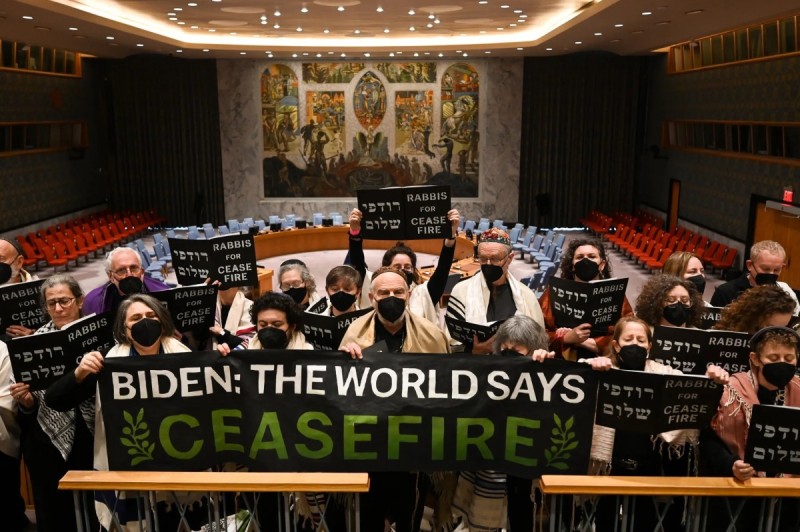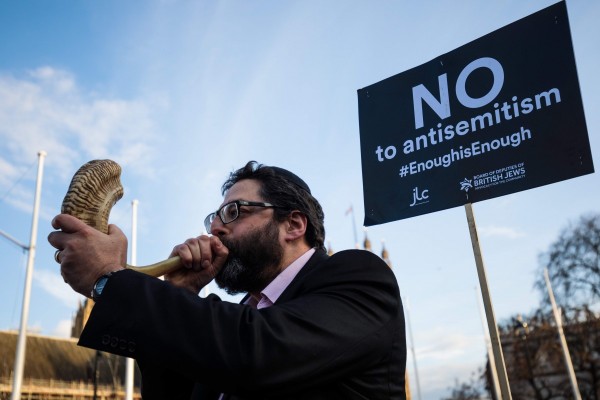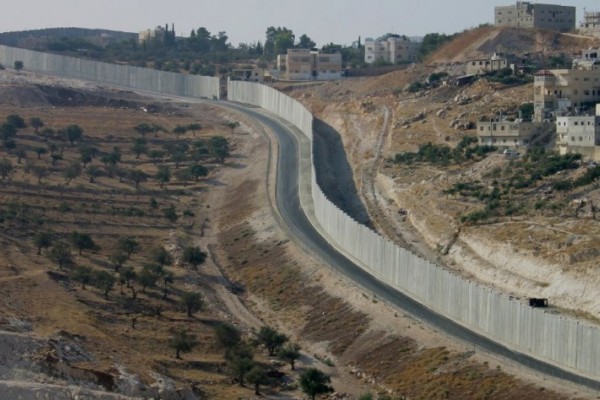Where are Canada’s pro-Palestine rabbis?
Institutional Jewish and rabbinical support for a ceasefire and humanitarian aid in Gaza has been less vocal in Canada

Members of Rabbis for Ceasefire stage a demonstration at a United Nations General Assembly meeting to condemn the US veto of a ceasefire in Gaza, January 9, 2024. Photo by Ever Hana.
In February 2025, 350 rabbis signed an ad in the New York Times condemning US President Donald Trump’s proposed plan to ethnically cleanse and take ownership of Gaza and build the “Riviera of the Middle East.” In May, Israeli rabbis joined one of many protests at the Gaza border, calling for a ceasefire and humanitarian aid for the besieged population. A year earlier, in April 2024, the group US Rabbis for Ceasefire and the Israeli organization Rabbis for Human Rights had also rallied for an end to the violence and increased assistance to civilians. Several participants were arrested. In both the United States and Israel, rabbinical groups have emerged in solidarity with Palestinians, responding to the ongoing genocide. Though still outside mainstream rabbinical discourse, hundreds of rabbis from both nations have spoken out and taken action to demand justice.
In the US, several synagogues have engaged in varying levels of pushback against Israeli brutality in Gaza and the West Bank. Since 2015, Tzedek Synagogue and Rabbi Brant Rosen in Chicago have run an explicitly anti-Zionist temple. At a time when many Canadians are deeply concerned about rising fascism in the US as well as Israel’s actions, it may seem surprising that institutional Jewish and rabbinical support for a ceasefire and humanitarian aid has been less vocal in Canada than in the US.
In Canada, only a small handful of religious Jewish institutions or congregational rabbis have publicly voiced support for a ceasefire or humanitarian aid to Gaza. These include Rabbi Elizabeth Bolton of Ottawa’s Or Haneshamah congregation and Rabbi Denise Handlarski of Toronto’s Oraynu Congregation, who are both original signatories to Rabbis for Ceasefire’s statement.
While private conversations may be taking place within synagogues and Jewish institutions, the growing global chorus of rabbinic and Jewish voices advocating for Gaza raises a pressing question: why is Canada falling behind? In a country often seen as tolerant and welcoming, it is striking that mainstream Jewish institutions and faith leaders here have been noticeably less vocal than their counterparts in the US and Israel.
In Canada, pro-Palestinian Jewish advocacy has largely been led by grassroots organizations like Independent Jewish Voices and If Not Now, with some rabbis among their members. However, those rabbis who have spoken out publicly are typically either retired or lead online congregations without physical communities. Unlike the American group Jewish Voice for Peace, which has an established rabbinic council made up of active faith leaders, Independent Jewish Voices in Canada currently includes too few rabbis to form a similar body.
Despite Canada’s geographic closeness to the US, Jewish attitudes in the two countries differ markedly. When it comes to views on Gaza and Palestine, Jewish Canadians align more closely with communities in Europe. In the United Kingdom, for example, there has been significant grassroots Jewish support for Palestine since October 2023. Despite this groundswell of public sentiment, institutional Jewish leadership and faith leaders have largely remained silent.
This conservative outlook is not a new phenomenon, but has become more readily apparent since the events of October 7, 2023. Canadian Jews hold more conservative views than their American counterparts, not just concerning Israel, but also with respect to Canadian politics. Although the most recent federal election did not necessarily see an increase in Jewish Canadian electoral support for the Conservative Party, there was proportionally more Jewish support for the Conservatives in Canada than there was Jewish support for the Republicans in the US. In 2019, the United Jewish Appeal Federation of the Greater Toronto Area boasted that Toronto is the most Zionist community in the world.
Canada experienced an early influx of European Jewish immigrants, with the largest wave arriving between the late-19th century and the end of the First World War. Having had more time to establish themselves within Canadian society, it is perhaps unsurprising that European Jewish communities with roots in Canada dating back a century or more tend to hold views more closely aligned with those of the average white Canadian. However, as regards Israel, according to 2024 Leger poll, among non-Jewish Canadian adults, 49 percent agreed that “the war Israel is conducting in Gaza is an example of genocide,” 34 percent agreed that Israel is an apartheid state, 38 percent agreed that Zionism is “a form of racism.”
Founded in 1917, United Jewish Appeal (UJA) is one of Ontario’s oldest and most influential Jewish organizations. It is also among the largest funders of Jewish programs and spaces in the region. Through its support of 63 institutional partners—including major organizations like the Jewish Community Centre and Jewish Family and Child Services—UJA’s funding reaches the vast majority of Jewish institutions. Given how deeply many of them rely on UJA support, speaking out publicly or taking a stance can risk upsetting boards and funders.
One Canadian Jewish institution has publicly shared a statement in support of Palestine. This is the United Jewish People’s Order (UJPO), originally founded in 1926 as a left-wing labour organization based on secular principles of anti-fascism which originated from Jewish socialist movements in Eastern Europe, like the General Jewish Labour Bund. Still active as a small progressive organization, UJPO was among the first Canadian Jewish groups to speak out in solidarity with Palestinians.
Rooted in the left-wing traditions of the Yiddish-speaking community, UJPO stands apart in urging Jewish voices to speak up. As UJPO Toronto’s Executive Director, Sarena Sarain, said when asked why so few other Canadian Jewish institutions have spoken out publicly about the plight of the Palestinians:
For UJPO, Jewishness is a cultural and ethical identity rooted in values like justice, solidarity, and anti-oppression—not in allegiance to a nation state. This foundational belief allows UJPO to critique the actions of the Israeli government without compromising our Jewish identity. While most mainstream Jewish institutions avoid public criticism of Israel out of a fear of mischaracterized antisemitism, UJPO argues that silence in the face of injustice is a betrayal of Jewish ethical tradition, not its fulfillment. Our stance reflects a legacy of Jewish dissent, where opposing state violence is not a break from Jewish identity, but a deep expression of it.
How can the Canadian Jewish left urge faith leaders and institutions to publicly stand against Israel’s ongoing genocide? As more and more Jews are realizing that Israel’s unrelenting war on Palestinians in Gaza and the West Bank is not being waged to keep Jews safe, either in Israel or around the world, they are supporting the growing calls for aid and a ceasefire. While some are turning away from Jewish institutions and spaces promoting Zionism, others are joining forces to lobby their institutions and faith leaders to speak out on Palestine.
Yet, with so much Jewish institutional funding tied to Zionist donors, speaking out often evokes fears of job loss and community banishment. At what point will Canada’s Jewish faith leaders and institutions decide that the number of dead Palestinians is too high to remain silent?
Editor’s note: A previous version of this article incorrectly stated that no Canadian congregational rabbis have publicly spoken out against Israel’s war in Gaza. In fact, several congregational leaders have made public statements in support of the Palestinian people. Canadian Dimension regrets the error.
Anna Lippman is a third-generation Ashkenzi Jewish settler on Turtle Island (North America). She is a PhD student in Sociology at York University. Anna’s research looks at identity, and how young people’s thoughts about themselves are influenced by the world around them. Anna organizes with several groups in Toronto including Showing Up for Racial Justice and Independent Jewish Voices.










_600_400_90_s_c1.jpg)